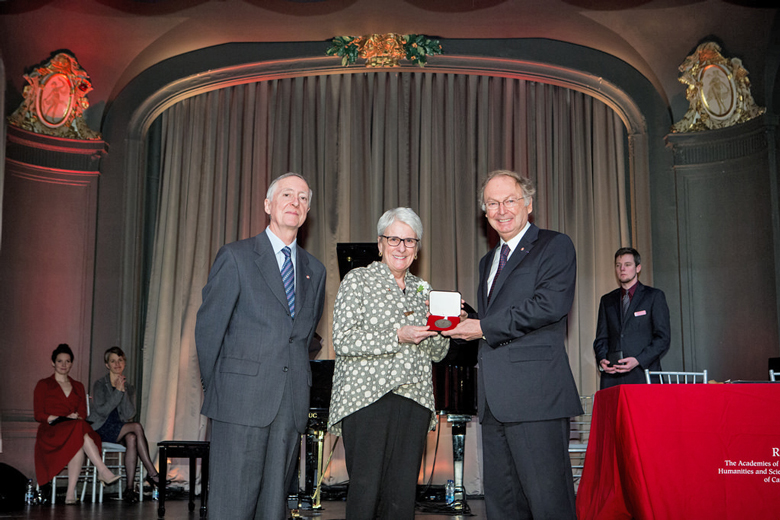
This festschrift celebrates the remarkable scholarly achievements of our colleague Janine Brodie. Awarded a PhD in Political Science from Carleton University in 1981, she began her teaching career at Queen’s University. She moved to York University in 1983, where she quickly climbed the academic ranks, and held prestigious positions such as the John Robarts Chair in Canadian Studies, and the Inaugural Director of the York’s Centre for Feminist Research. In 1997, Dr. Brodie was recruited to the University of Alberta as Chair of the Department of Political Science, where she continues to teach.
During the past four decades, Dr. Brodie has written extensively on many of the core challenges in Canadian politics and political economy, including gender politics, social policy, citizenship equality, globalization, and neoliberal governance. She is the author or coauthor of eight books and the editor or coeditor of five others. She also launched and edited Critical Concepts: An Introduction to Politics, with Sandra Rein and Malinda Smith, which is now in its fifth edition. Dr. Brodie has published over 100 book chapters, and journal articles in such venues as Feminist Theory, Citizenship Studies, Studies in Political Economy, International Journal of Law in Context, and North Carolina Law Review. Her work has been translated in French, Spanish and Polish.
Dr. Brodie’s prolific and influential research career has been multifaceted, pioneering, and generative, challenging conventional narratives in Canadian politics, and opening new conceptual spaces within the discipline for cutting-edge and inclusive scholarship. Her innovative research and sustained commitment to advancing the social sciences in Canada has been recognized with election as Fellow to the Royal Society of Canada (2002), the award of a Tier 1 Canada Research Chair in Political Economy and Social Governance (renewed in 2010), a Trudeau Fellowship (2010-2013), and a Distinguished University Professorship at the University of Alberta (2011). During these years, she also was elected as Director of the social science division of the Royal Society, serving a five-year term. In 2013-2014, she was awarded the Queen Elizabeth II Diamond Jubilee Medal (for service to the social sciences), appointed as an inaugural Fellow to the Broadbent Institute, and awarded the Royal Society’s Innis-Gérin Medal, honoring her “distinguished and sustained contribution to the literature of the social sciences.” In 2017, on the occasion its 75th anniversary celebrations, Dr. Brodie was named as one of Carleton University’s seventy-five most distinguished alumni. Throughout her academic career, Dr. Brodie has combined her research pursuits with academic leadership, mentorship of graduate, post-graduate and junior faculty, and active engagement with policy networks.
 The contributions to this symposium on “Neoliberalism and its Crises” explore three thematic streams that have been central to Dr. Brodie’s research program: gender and politics; political economy and governance; and, citizenship.
The contributions to this symposium on “Neoliberalism and its Crises” explore three thematic streams that have been central to Dr. Brodie’s research program: gender and politics; political economy and governance; and, citizenship.
Dr. Brodie’s long-standing intellectual engagement with gender and politics has been a major force in establishing and defining this field in Canada, first, by exploring obstacles to political representation, and then, by tracking opportunities and constraints for gender-based claims- and policy-making within both post-war social liberal and neoliberal governing paradigms. Her 1985 book, Women in Politics in Canada, was the first book on this subject published in Canada. Dr. Brodie also was among the first to explore the implications of state restructuring and the ascendance of neoliberal governing practices for women and social reproduction more broadly, as initially outlined in her 1995 book, Politics on the Margins, and, later, with Isabella Bakker, in Where are the Women? (2008). Dr. Brodie’s prodigious work in this stream of research has focused on successive experimentation with the social “crises” inherent in neoliberal thinking, and its implications for gender equity, inclusive citizenship, and social wellbeing.’
Dr. Brodie’s contributions to the study of Canadian political economy and governance have been similarly extensive and influential. Her first co-authored book Crisis, Challenge and Change (with Jane Jenson, 1980, 1984) on the historical development of Canada’s party system as well as her 1990 book, The Political Economy of Regionalism, remain important contributions to the field. In the early 2000s, her work focused on globalization, as one of the principal investigators in the multi-year MCRI project, Globalization and its Challengers, and co-editor of Remapping Gender in the New Global Order with Marjorie Cohen (2007). Later, Dr. Brodie wrote extensively on regional projects, such as the failed Security and Prosperity Partnership, which attempted to fashion a new North America through regulatory harmonization and securitization. Her work in this stream uniquely blends the original insights of Canada’s early political economists such as Harold Innis with recent innovations in discourse analysis and governmentality theory.

Third, Dr. Brodie’s work on citizenship has also been influential in reframing the study of this critical domain of political life, with implications for numerous social science disciplines. Her work moves beyond decontextualized models of liberal democratic citizenship by tracking shifting national narratives, public policies, and citizen-state security bargains, which have defined the iconic Canadian citizen (the included), various disciplinary subjects (the excluded), and historical narratives of social justice. Dr. Brodie’s recent work systematically reveals neoliberal governing practices as experiments in governance that increasingly embed social and political insecurities in contemporary social structures and daily life. Her most recent work in this stream focuses on the interplay of neoliberal entropy, stagnation, austerity, and inequality.